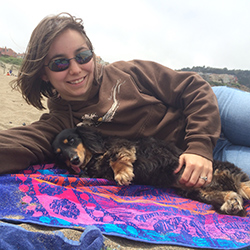But surely he must know that I know, at least some of the time. When my father got a DUI a few years ago, he didn’t try to hide it or deny it. He was required by the court to have a breathalyzer installed in his car; when he would call me on the phone, it would beep in the middle of our conversation. “Hold on,” he would say while I waited on the other end for him to blow through the mouthpiece until it stopped blaring. Then we would continue our conversation as if nothing happened. But he never pretended like it didn’t exist. He was thrilled even, proud of himself, when he was able to pay off his court fines ahead of schedule and called to tell me the news.
As I take another sip of water, I’m confused by my father’s ignorance and hypocrisy—did he really expect me to wait to drink alcohol when it was so prevalent in my childhood? I wonder if his beer, still half full, is already going to his head. Surely a man my father’s size wouldn’t be buzzed already.
Then I remember the empty forty-ounce Budweiser can I found sitting on top of the trashcan in our hotel room right before we left for dinner. It surprised me to see it there, hiding in plain sight. I can’t recall ever seeing alcohol in my house as a child. Maybe it’s because he didn’t have to keep it there; my dad had an entire bar to store his beer cans and tequila bottles instead of on a shelf in the fridge or a hard-to-reach cabinet.
I’m embarrassed, feeling like a bad girl who has been put in timeout. I’ve forever changed the way my father looks at me. He used to threaten me as a teenager. I’ve got eyes everywhere watching you, he’d say. I rolled my eyes because it was a lie. After he dropped me off at home after school, he wouldn’t know the difference if I stayed home the rest of the evening or went to a party. He never gave me a sex talk or a drugs and alcohol talk. I think he thought that his threat scared me, but part of it was that he actually trusted that I wouldn’t do those things because he knew I was a good girl.
Something else gnawing is at me, a feeling of guilt that I can’t even be honest with my own father. Lying to him feels like a betrayal of what a father-daughter relationship should be, even though our relationship has never been normal. Food has always been the strongest part of our relationship; when he’d ask me about what I’d eaten for the day, it was the way I knew he cared. That had usually been enough.
I think back to when my mother would ask me as a child if my father had been drinking, and I’d tell her yes.
Usually I would lie and tell her no to keep the peace, but sometimes the way my father acted made me so nervous I couldn’t take it. My mother would then call him and yell, warning him that if he kept drinking, she’d find someone else to pick me up from school so she could continue to work full time. She would threaten to take him to court for full custody.
The next day after school my father would look sullen as I got into the car, like a dog with his tail between his legs.
“Did you tell your mother yesterday that I was drinking?” he asked.
“No,” I said.
My father has now turned to my brother at the table. He warns him not to party too much while he’s in school. My father doesn’t say not to party at all, just not too much. I never got this talk when I left for college. Maybe my father thinks that because they’re both male, he understands my brother’s impulses and temptations as a young man. Maybe he is actually worried that my brother doesn’t have the same sense of self-control that I did, or at least that he thought I did.
We’re interrupted when our food gets to the table. The King Crab sits in a bowl, steam wafting into the air. It’s almost too hot to touch. My father unwraps his shell cracker from his napkin excitedly. Up until I left home, he used to cut up all my food for me, taking my plate away when it would come to the table to slice my steak into bite-sized pieces, crack my lobster tail for me. But today, he just hands me my silverware and digs in, sighing satisfactorily. The waitress asks him if he wants another beer. He tells her no. She asks my brother and me if we want anything else to drink.
“No thank you,” I say, “I’m good with water.”
Krista Varela recently received her MFA from Saint Mary’s College of California, where she is now a lecturer. She is also assistant editor for The East Bay Review. Previous publications include Toasted Cheese Literary Journal, Vagabond City, Blotterature, and Red Savina Review.
